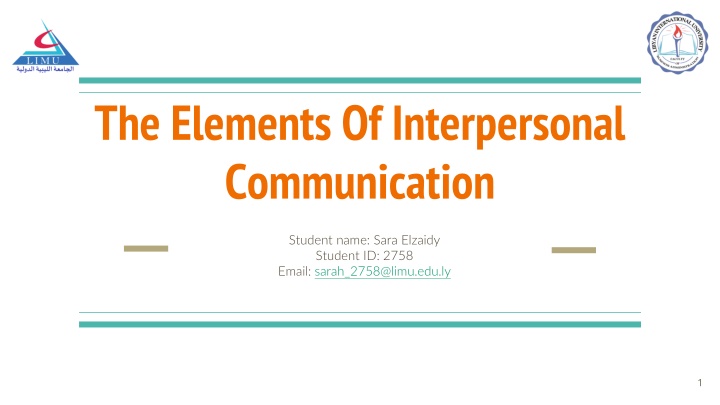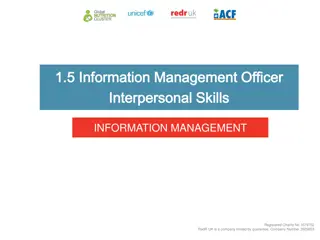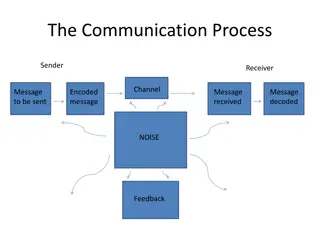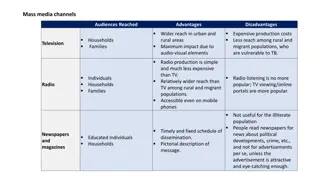Mastering Interpersonal Communication Skills for Success in the Workplace
Interpersonal communication involves the exchange of information, ideas, and feelings through verbal and non-verbal methods. Developing strong skills in encoding, decoding, feedback, and utilizing different communication mediums is crucial for effective communication. Good interpersonal skills enhance productivity, foster positive relationships, and contribute to successful team projects. Acquiring and honing these skills are essential for creating and maintaining meaningful connections in the workplace.
Download Presentation

Please find below an Image/Link to download the presentation.
The content on the website is provided AS IS for your information and personal use only. It may not be sold, licensed, or shared on other websites without obtaining consent from the author.If you encounter any issues during the download, it is possible that the publisher has removed the file from their server.
You are allowed to download the files provided on this website for personal or commercial use, subject to the condition that they are used lawfully. All files are the property of their respective owners.
The content on the website is provided AS IS for your information and personal use only. It may not be sold, licensed, or shared on other websites without obtaining consent from the author.
E N D
Presentation Transcript
The Elements Of Interpersonal Communication Student name: Sara Elzaidy Student ID: 2758 Email: sarah_2758@limu.edu.ly 1
T Table of Contents : able of Contents : 01 02 INTERPERSONAL COMMUNICATION SKILLS. IMPORTANCE OF INTERPERSONAL COMMUNICATION. 03 04 CONCLUSION. REFRENCES. 2
INTRODUCTION Interpersonal communication is the process of trade of information, ideas, and feelings between two or more people through verbal or non-verbal methods. It often includes face-to- face trade of data, in a frame of voice, facial expressions, body dialect, and motions. The level of one s interpersonal communication aptitudes is measured through the viability of exchanging messages to others. 3
The Main 6 Interpersonal Communication Skills: Encoding and Decoding The Sender 1 2 3 The Receiver We all play this communication part, a few ways are better than others. On the off chance what we do it well, we are skilled within the fine art of tuning in. To form that happen, there s an invisible process going on known as translating, the transformation of language into thought and meaning. Communication starts with a source, a person, bunch, or organization with meaning to share. Then, the encoding happens on the sender side. it s an invisible process during which a message moves from thought to language. To transmit meaning, the sender must put meaning into an arrangment of symbols that represent concepts known to the receiver. While within the decoding process, symbols convert into concepts and ideas meaning something to the receiver. 4
The Medium Receiver Feedback 4 5 6 Great communication make use of the nonverbal channels the normal person isn t mindful of. Feedback should flow back to the sender continuously, but usually seldom the case. A sender chooses some type of communication medium. The three classic communication transmission channels are: written, verbal and electronic. A receiver is an individual, group or organization decoding the message. 5
Importance of Interpersonal Communication Interpersonal communication skills can assist you in being more productive at workplace, forming strong and pleasant connections with coworkers, and completing team projects efficiently and successfully. Good interpersonal skills can have a positive impact on the morale and productivity of your entire team or department. 6
CONCLUSION Interpersonal skills are extermely vital for creating and keeping up important individual connections in the workplace. People with great interpersonal communication skills can, in the manner, construct sound connections with their colleagues and work much better as a team. 7
REFRENCES Interpersonal Communication Skills: 6 you must master. Legacee. (2021, August 22). Retrieved October 20, 2021, from https://www.legacee.com/communication- skills/interpersonal#:~:text=The%20interpersonal%20communication%20model%20looks,flows%20 between%20sender%20and%20receiver. 8























